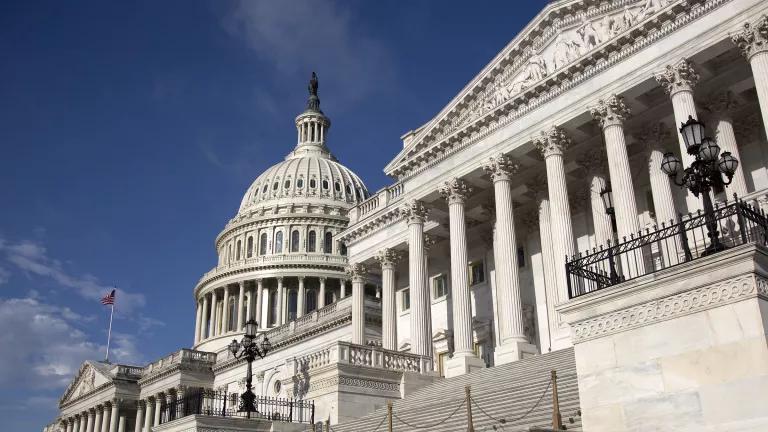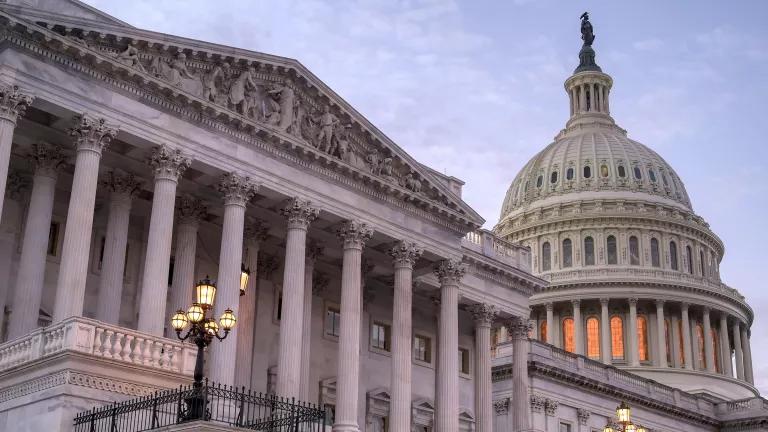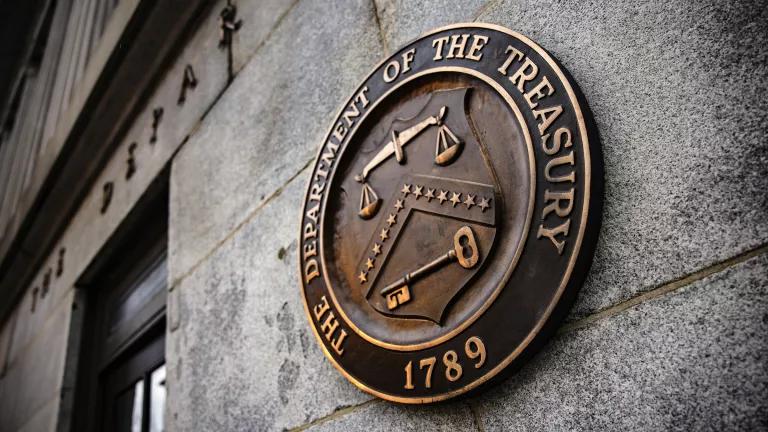New House Energy Agenda Is Out of Touch with Reality
The Committee’s priority still appears to be cutting taxes on companies earning tens of billions in windfall profits, and to weaken the nation’s landmark environmental laws that protect Americans from their pollution.

Energy and Commerce Committee Chair Cathy Rodgers speaking during a field hearing in Texas
Energy and Commerce Committee
After a series of taskforces, roundtables, and hearings promising that they were finally bringing forward an energy agenda that takes seriously the reality of the threat of climate change, the new majority on the House Energy and Commerce Committee is set to move its first tranche of bills, and it’s not a good start. Tomorrow, it will hold a marathon hearing on “Unleashing American Energy, Lowering Energy Costs, and Strengthening Supply Chains.” That vague and seemingly benign title disguises an oil, gas, and coal industry wish list of 17 bills to turn back the clock towards weaker environmental laws, more unbridled development of the fuels that drive climate change, and endangering communities across the country.
According to the Committee majority oil, gas and coal companies are actually the victims of government oppression and overreach. Here is the reality: the United States is currently the number one producer of oil and gas in the world (also still the number one contributor to historical GHG emissions). The companies behind these fuels have enjoyed more than a century of government subsidies, are reaping record profits, and are fighting the transition toward clean energy that we need to strengthen America’s economic and national security, create millions of new jobs, and prevent catastrophic climate change.
The Committee’s priority still appears to be cutting taxes on companies earning tens of billions in windfall profits, and to weaken the nation’s landmark environmental laws that protect Americans from their pollution.
Here are the highlights of their misguided vision:
- More Domestic Mining and Drilling (H.R.___) – We need to shore up American supplies of the “critical minerals” needed for batteries and other clean energy technologies. But this bill slyly defines almost all kinds of mining and old energy development as “critical minerals” production and it weakens community, worker safety, and environmental safeguard
- Cutting Taxes on Polluters (H.R. 484) - would repeal the tax on methane leakage from gas infrastructure enacted just last year in the Inflation Reduction Act, encouraging companies to ignore leaks that release potent greenhouse gases, pollute the air, and raise consumer energy costs.
- Weakening Review of Cross-border Energy Projects (H.R. ___) vests authority to issue cross-border permits for energy related infrastructure with FERC (oil and gas) and DOE (transmission) and supersedes presidential authority. This means any future cross-border pipeline proposals or expansions of existing pipelines, regardless of how significant the changes might be, would be subject to minimal review by key regulators.
- Undermining Gas Pipeline Safety (H.R.__) - weakens the existing environmental review process by giving a FERC, an agency without environmental expertise, decision making authority instead of EPA and existing environmental agencies.
- Rushing LNG Export Reviews (H.R. 647) - Guts public interest review requirements for gas imports and exports. LNG exports exacerbate climate change, raise domestic energy prices, and perpetuate environmental injustices. These should be considered by decision makers on export terminals.
- Weakening Refinery Safety (H.R.__) - would stop EPA from ever issuing a rulemaking requiring safer alternatives to hydrofluoric (HF) acid use at refineries. In 2019 a massive refinery explosion in Philadelphia was caused by HF corrosion. During the incident, over 5,000 pounds of HF were released, and five employees were injured. This resulted in a property damage of $750 million and endangered the 117,000 residents who live within a mile of the refinery.
- Waiving Fundamental Environmental Laws (H.R. __, To authorize the Administrator of the Environmental Protection Agency to waive application of certain requirements…) - would allow the EPA to waive any and all environmental protections under the Clean Air Act and Solid Waste Disposal Act for any facility vaguely deemed to be a “critical energy resource.”
- Weakening the Toxics Substances Control Act (H.R. __, To amend the Toxic Substances Control Act with respect to critical energy resources, and for other purposes) - would make it virtually impossible for EPA to meaningfully review the safety of new chemicals that are classified as “critical energy resources,” regardless of their health risks. The bill promotes cursory assessments, followed by default approvals, of any new chemical that is deemed necessary for a “critical energy resource,” no matter how toxic, how persistent, or how mobile in the environment.
- Undermining the Clean Air Act (H.R. __, To require the Administrator of the Environmental Protection Agency to authorize the use of flexible air permitting…) would allow the EPA Administrator to ignore the scientific process of approving or denying flexible air permitting. This could allow an increase of air pollution from so-called “critical energy resource facilities,” subsequently harming environmental and public health.
- Preventing Public Input on Hazardous Waste (H.R. __, To amend the Solid Waste Disposal Act to treat the owner or operator of a critical energy resource facility as having been issued an interim permit…) – would allow all “critical energy resource" facilities to have interim status, which allows them to treat, store and dispose of hazardous waste without an EPA permit, circumventing public input process and creating potential safety issues.
- Repealing the Greenhouse Gas Reduction Fund (H.R. __) - would repeal the newly created Greenhouse Gas Reduction Fund at EPA, a first of its kind, $27 billion dollar program designed to finance energy saving projects in low-income areas through private public partnerships.
- Congressional Resolution on Oil and Gas Exports (H.Con.Res. __) - supports placing no restrictions on oil and gas exports amidst a package of bills justified as securing U.S. energy independence. This resolution demonstrates how nonsensical Republicans’ energy agenda is: House Republicans just passed two separate pieces of legislation that do exactly the opposite of this resolution.
- Supporting Keystone XL Pipeline (H.Con.Res. __) - expresses disapproval of President Biden’s revocation of the Keystone XL pipeline’s cross-border permit. Keystone XL was shown to be unable to safely transport the world’s dirtiest oil from Canada through the U.S. for export, leaving regular people with all of the risk and little if any reward.
That these bills are at the front of the line of the new majority's energy agenda is extremely concerning. This agenda is not rooted in reality and would start out by undermining public protections from dangerous pollution caused by energy development, rather than trying to find a path where energy development, environmental protection and community safety work together. If the new majority is serious about climate change, they need to do much better going forward.



